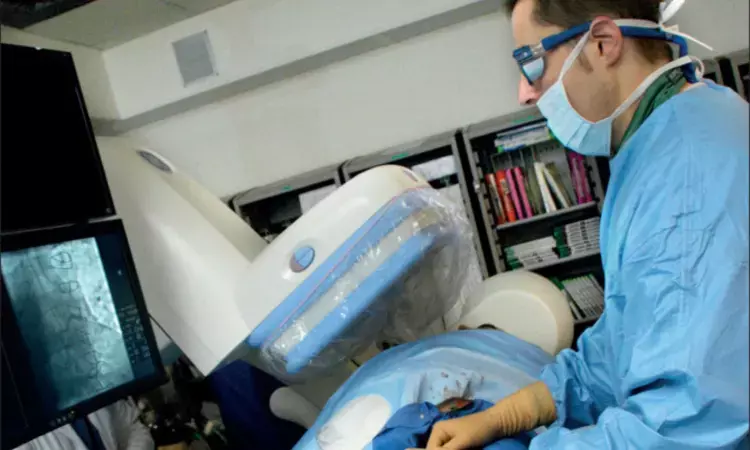- Home
- Medical news & Guidelines
- Anesthesiology
- Cardiology and CTVS
- Critical Care
- Dentistry
- Dermatology
- Diabetes and Endocrinology
- ENT
- Gastroenterology
- Medicine
- Nephrology
- Neurology
- Obstretics-Gynaecology
- Oncology
- Ophthalmology
- Orthopaedics
- Pediatrics-Neonatology
- Psychiatry
- Pulmonology
- Radiology
- Surgery
- Urology
- Laboratory Medicine
- Diet
- Nursing
- Paramedical
- Physiotherapy
- Health news
- Fact Check
- Bone Health Fact Check
- Brain Health Fact Check
- Cancer Related Fact Check
- Child Care Fact Check
- Dental and oral health fact check
- Diabetes and metabolic health fact check
- Diet and Nutrition Fact Check
- Eye and ENT Care Fact Check
- Fitness fact check
- Gut health fact check
- Heart health fact check
- Kidney health fact check
- Medical education fact check
- Men's health fact check
- Respiratory fact check
- Skin and hair care fact check
- Vaccine and Immunization fact check
- Women's health fact check
- AYUSH
- State News
- Andaman and Nicobar Islands
- Andhra Pradesh
- Arunachal Pradesh
- Assam
- Bihar
- Chandigarh
- Chattisgarh
- Dadra and Nagar Haveli
- Daman and Diu
- Delhi
- Goa
- Gujarat
- Haryana
- Himachal Pradesh
- Jammu & Kashmir
- Jharkhand
- Karnataka
- Kerala
- Ladakh
- Lakshadweep
- Madhya Pradesh
- Maharashtra
- Manipur
- Meghalaya
- Mizoram
- Nagaland
- Odisha
- Puducherry
- Punjab
- Rajasthan
- Sikkim
- Tamil Nadu
- Telangana
- Tripura
- Uttar Pradesh
- Uttrakhand
- West Bengal
- Medical Education
- Industry
Quantitative coronary angiography acceptable alternative to IVUS to assist angiography-guided PCI: JAMA

Korea: To guide drug-eluting stent implantation, a standardized quantitative coronary angiography (QCA) may be an acceptable alternative to intravascular ultrasonography (IVUS), a recent study published in JAMA Cardiology has shown.
The randomized clinical trial, including 1528 patients with coronary artery stenosis undergoing PCI, revealed similarly low rates of target lesion failure at 12 months in both QCA- and IVUS-guided percutaneous coronary intervention (PCI) groups. Guidance via quantitative coronary angiography resulted in a similar post-PCI minimum lumen diameter as IVUS guidance.
Coronary angiography is the most commonly used technique for guiding stent implantation. However, angiography-guided PCI relies on visual estimation, suffers from subjectivity, and often underestimates vessel size and stent expansion. IVUS can provide reliable quantitative and qualitative information regarding the lumen, vessel, plaque, and deployed stents.
Although intravascular ultrasonography guidance promotes favorable outcomes after PCI, many catheterization laboratories worldwide lack access. Therefore, Pil Hyung Lee, University of Ulsan College of Medicine, Seoul, Korea, and colleagues aimed to investigate whether systematic implementation of quantitative coronary angiography to assist angiography-guided PCI could be an alternative strategy to IVUS guidance during stent implantation.
For this purpose, the researchers conducted a randomized, open-label, noninferiority clinical trial enrolling adults with chronic or acute coronary syndrome and angiographically confirmed native coronary artery stenosis requiring PCI. Enrollment was done in 6 cardiac centers in Korea from 2017 to 2021, and follow-up occurred through 2022.
Following successful guidewire crossing of the first target lesion, patients were randomized in a ratio of 1:1 to receive either QCA- or IVUS-guided PCI. 1528 patients who underwent PCI with QCA guidance (763; mean age, 64.1 years; 5775.2% males) or IVUS guidance (765; mean age, 64.6 years; 81.3% males), were included in the trial.
The primary outcome was target lesion failure at 12 months, defined as a composite of target vessel myocardial infarction, cardiac death, or ischemia-driven target lesion revascularization. The trial was designed assuming an event rate of 8%.
The researchers reported the following findings:
- The post-PCI mean minimum lumen diameter was similar between the QCA- and IVUS-guided PCI groups (2.57 versus 2.60 mm).
- Target lesion failure at 12 months occurred in 3.81% of patients in the QCA-guided PCI group and 3.80% of patients in the IVUS-guided PCI group (absolute risk difference, 0.01 percentage points; hazard ratio, 1.00).
- There was no difference in the rates of stent edge dissection (1.2% versus 0.7%), stent thrombosis (0.53% versus 0.66%), or coronary perforation (0.2% versus 0.4%) between the QCA- and IVUS-guided PCI groups.
- The risk of the primary endpoint was consistent regardless of subgroup, with no significant interaction.
Findings of this randomized clinical trial suggest that QCA and IVUS guidance during PCI showed similar rates of target lesion failure at 12 months.
"However, due to the lower-than-expected rates of target lesion failure in this trial, the results should be interpreted cautiously," the researchers concluded.
Reference:
Lee PH, Hong SJ, Kim H, et al. Quantitative Coronary Angiography vs Intravascular Ultrasonography to Guide Drug-Eluting Stent Implantation: A Randomized Clinical Trial. JAMA Cardiol. Published online March 13, 2024. doi:10.1001/jamacardio.2024.0059
Dr Kamal Kant Kohli-MBBS, DTCD- a chest specialist with more than 30 years of practice and a flair for writing clinical articles, Dr Kamal Kant Kohli joined Medical Dialogues as a Chief Editor of Medical News. Besides writing articles, as an editor, he proofreads and verifies all the medical content published on Medical Dialogues including those coming from journals, studies,medical conferences,guidelines etc. Email: drkohli@medicaldialogues.in. Contact no. 011-43720751


